BAABA MAAL featuring ERNEST RANGLIN / “Koni”
I was talking to my brother the other day and he said, “When are you y’all going to do some African music?”* I hadn’t thought about it before, but his question makes sense. Although we do post an awful lot of music that can easily be traced back to Africa, we don’t post much music by actual African musicians.
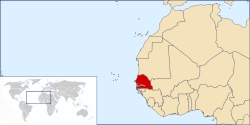 Of course, Africa is a continent, not a country or a region. In fact, Africa is the second largest continent in the world — home to nearly one billion people and countless different cultures, societies and styles of music. In a way, there is no such thing as “African” music. So how’s about one country at a time? This week, I’m going to hit y’all up with a few of my favorite tunes from one of the most musical countries in Africa — Senegal.
Of course, Africa is a continent, not a country or a region. In fact, Africa is the second largest continent in the world — home to nearly one billion people and countless different cultures, societies and styles of music. In a way, there is no such thing as “African” music. So how’s about one country at a time? This week, I’m going to hit y’all up with a few of my favorite tunes from one of the most musical countries in Africa — Senegal.
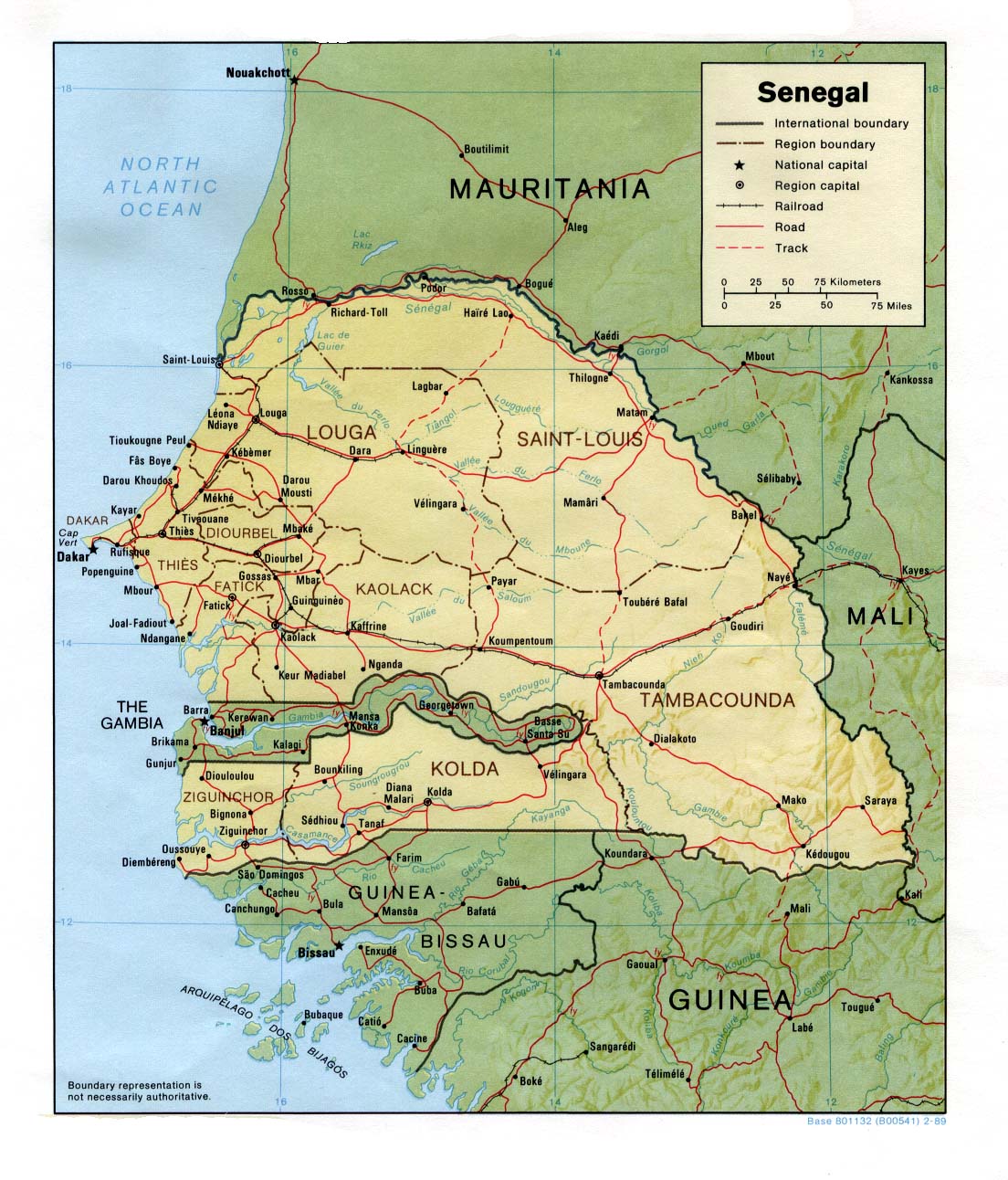 For those who don’t know, Senegal is on the coast of Western Africa, just west of another very musical African country, Mali, and to the east of the islands of Cape Verde, a place we talk about often here at BoL. Senegal’s capital and largest city (pop. 2,000,000) is the coastal city of Dakar.
For those who don’t know, Senegal is on the coast of Western Africa, just west of another very musical African country, Mali, and to the east of the islands of Cape Verde, a place we talk about often here at BoL. Senegal’s capital and largest city (pop. 2,000,000) is the coastal city of Dakar.
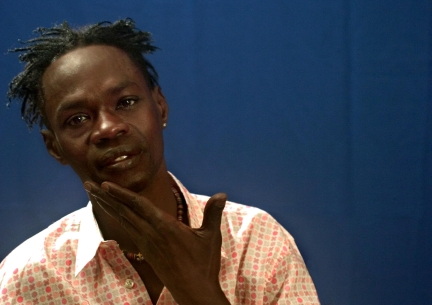 Let’s start with one of the best known Senegalese musicians and a personal favorite of my brother’s, the guitarist, singer and percussionist Baaba Maal. Maal is from a small town in Northern Senegal called Podor. He was expected to be a fisherman, as his father was, but he gravitated towards music and after studying in Paris, he returned to Senegal, eventually becoming one of the most famous African musicians in the world. The tune in the jukebox, “Koni,” is from Maal’s 1999 release Live At The Royal Festival Hall. It’s a lullaby Maal says he learned from his mother. Jamaican legend Ernest Ranglin is helping out on guitar.
Let’s start with one of the best known Senegalese musicians and a personal favorite of my brother’s, the guitarist, singer and percussionist Baaba Maal. Maal is from a small town in Northern Senegal called Podor. He was expected to be a fisherman, as his father was, but he gravitated towards music and after studying in Paris, he returned to Senegal, eventually becoming one of the most famous African musicians in the world. The tune in the jukebox, “Koni,” is from Maal’s 1999 release Live At The Royal Festival Hall. It’s a lullaby Maal says he learned from his mother. Jamaican legend Ernest Ranglin is helping out on guitar.
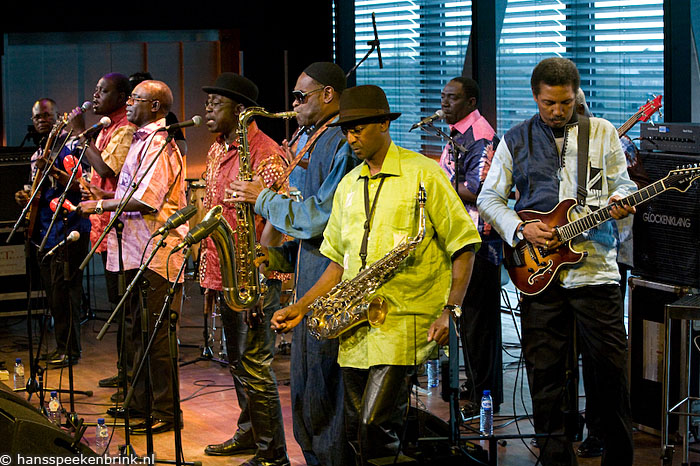 This is a Contemporary post, but I have to include one classic record, “Utrus Horas” by Orchestre Baobab, a band whose mellow style and melancholic vibe reminds me a lot of the famous Cape Verdian sound. Throughout the 1970s, Baobab was one of the biggest bands in Africa. They released album after successful album and even hosted their own Dakar nightclub. In the ‘80s, Baobab broke up, but not before they recorded tracks for what would eventually become their most popular album, Pirates Choice. It took almost another decade, but in 1989 the Pirates Choice album was finally released. After the record became an improbable international hit, the Orchestre rebanded and has since gone on to record several more albums, including last year’s Made In Dakar.
This is a Contemporary post, but I have to include one classic record, “Utrus Horas” by Orchestre Baobab, a band whose mellow style and melancholic vibe reminds me a lot of the famous Cape Verdian sound. Throughout the 1970s, Baobab was one of the biggest bands in Africa. They released album after successful album and even hosted their own Dakar nightclub. In the ‘80s, Baobab broke up, but not before they recorded tracks for what would eventually become their most popular album, Pirates Choice. It took almost another decade, but in 1989 the Pirates Choice album was finally released. After the record became an improbable international hit, the Orchestre rebanded and has since gone on to record several more albums, including last year’s Made In Dakar.
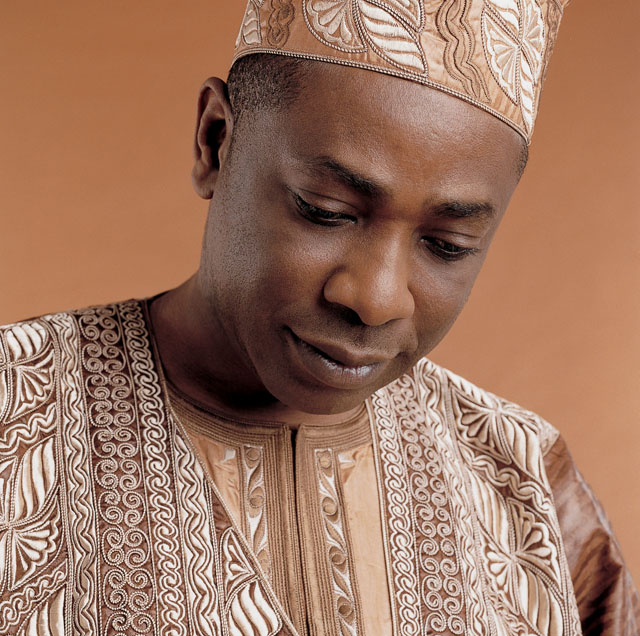 If there is a more famous Senegalese musician than Baaba Maal, it has to be Youssou N’Dour, a singer and composer whose career recently entered its fourth decade. Our selection is “Bamba The Poet” from Youssou’s 2004 album Egypt, a collection of sacred music that Youssou composed in conjunction with an Egyptian conductor named Fathy Salama. For me, the most notable thing about this song is the way it matches strength and grace, power and calmness. Youssou’s voice and the classical strings give the song a certain lightness of tone that belies its spiritual weight. Note too that this album, due to the addition of Egyptian and orchestral instrumentation, is a considerable departure from Youssou’s normal style which tends to be either an uptempo traditional sound (for his Senegalese albums) or a slicker “world music” sound (for his international releases).
If there is a more famous Senegalese musician than Baaba Maal, it has to be Youssou N’Dour, a singer and composer whose career recently entered its fourth decade. Our selection is “Bamba The Poet” from Youssou’s 2004 album Egypt, a collection of sacred music that Youssou composed in conjunction with an Egyptian conductor named Fathy Salama. For me, the most notable thing about this song is the way it matches strength and grace, power and calmness. Youssou’s voice and the classical strings give the song a certain lightness of tone that belies its spiritual weight. Note too that this album, due to the addition of Egyptian and orchestral instrumentation, is a considerable departure from Youssou’s normal style which tends to be either an uptempo traditional sound (for his Senegalese albums) or a slicker “world music” sound (for his international releases).
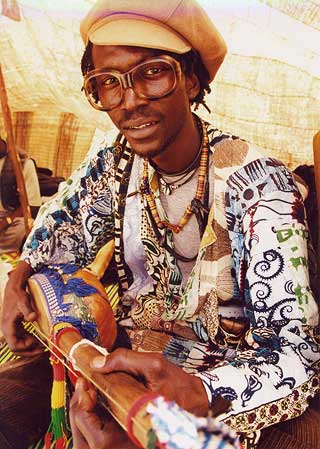 The final two selections are by lesser known Senegalese musicians, both of whom I came across at the excellent African music blog, Benn Loxo Du Taccu. The first is a very interesting musician named Nuru Kane. I won’t be surprised if Nuru ends up a lot more famous than he is now. He has that unnameable ‘it,’ a charismatic something that makes you pay a little extra attention whenever his music is playing. To whit, one reviewer accurately described Nuru’s attitude as “an almost regal confidence.” Notice how “Niane,” a track taken from Nuru’s 2006 debut album Sigil, sounds traditional, psychedelic and modern, all at the same time. It’s a strange mix of vibes, a mix I like a lot.
The final two selections are by lesser known Senegalese musicians, both of whom I came across at the excellent African music blog, Benn Loxo Du Taccu. The first is a very interesting musician named Nuru Kane. I won’t be surprised if Nuru ends up a lot more famous than he is now. He has that unnameable ‘it,’ a charismatic something that makes you pay a little extra attention whenever his music is playing. To whit, one reviewer accurately described Nuru’s attitude as “an almost regal confidence.” Notice how “Niane,” a track taken from Nuru’s 2006 debut album Sigil, sounds traditional, psychedelic and modern, all at the same time. It’s a strange mix of vibes, a mix I like a lot.
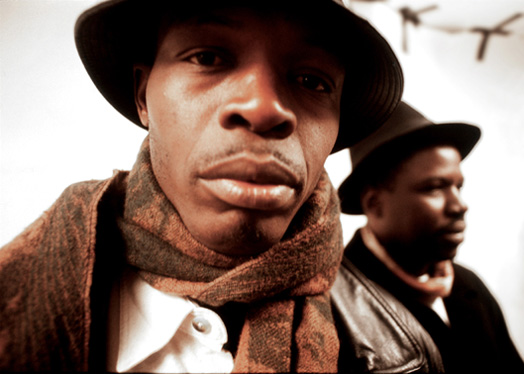 The last of this week’s Sengalese selections is by a duo named Pape & Cheikh. I don’t know anything about them, and this is the only track I’ve ever heard, but I like the multi-layered, tumbling feel of the percussion (including the poly-rhythmic handclaps) and I like their energy level. “Kamalemba” is from their 2004 album Mariama.
The last of this week’s Sengalese selections is by a duo named Pape & Cheikh. I don’t know anything about them, and this is the only track I’ve ever heard, but I like the multi-layered, tumbling feel of the percussion (including the poly-rhythmic handclaps) and I like their energy level. “Kamalemba” is from their 2004 album Mariama.
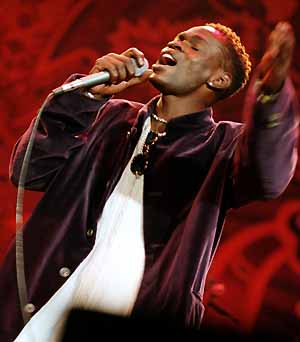 I’m including two tracks from Baaba Maal’s album Firin’ In Fouta, much of which was recorded on location in villages. My man Maal does both traditional and modern, acoustic and electronic.
“African Woman” is a praise song built on Afro-Cuban influences. Salsa is huge in Africa and here you hear a funky, funky horn-heavy blow out. “Swing Yela” is some crazy Senagalese dance music in the style they call Yela. In fact I’m going to add a third track. This is a remix built on Jamacian dancehall vibes taken from a remix EP called Ngalanka (Remix).
Baaba Maal is an intriguing musician. He’s holding on to the traditions with two hands, can drop the ancient songs with nary a misstep and at the same time he can roll with the latest flavor. This is some two-headed music that comes correct regardless of which way Baaba Maal faces.
Jazz is my heartbeat. There are a number of jazz albums featuring Senagalese musicians working in collaboration with jazz veterans, however, one of the best examples of Senagelese jazz is Kora Jazz Trio. They have two self-titled albums. “Folly” and a version of Monk’s “Rythm'Ming” are both from Kora Jazz Trio Part Two.
I’m including two tracks from Baaba Maal’s album Firin’ In Fouta, much of which was recorded on location in villages. My man Maal does both traditional and modern, acoustic and electronic.
“African Woman” is a praise song built on Afro-Cuban influences. Salsa is huge in Africa and here you hear a funky, funky horn-heavy blow out. “Swing Yela” is some crazy Senagalese dance music in the style they call Yela. In fact I’m going to add a third track. This is a remix built on Jamacian dancehall vibes taken from a remix EP called Ngalanka (Remix).
Baaba Maal is an intriguing musician. He’s holding on to the traditions with two hands, can drop the ancient songs with nary a misstep and at the same time he can roll with the latest flavor. This is some two-headed music that comes correct regardless of which way Baaba Maal faces.
Jazz is my heartbeat. There are a number of jazz albums featuring Senagalese musicians working in collaboration with jazz veterans, however, one of the best examples of Senagelese jazz is Kora Jazz Trio. They have two self-titled albums. “Folly” and a version of Monk’s “Rythm'Ming” are both from Kora Jazz Trio Part Two.
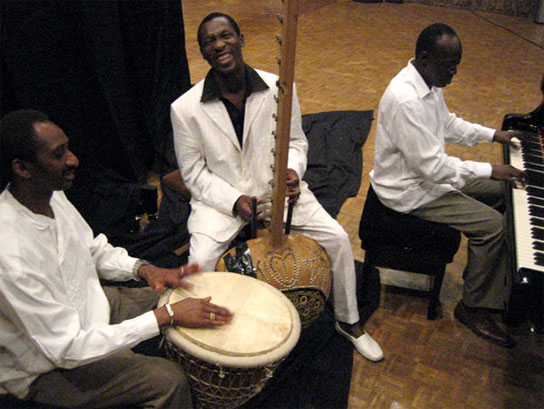 The Kora Jazz Trio has an instrumentation that is both unique for a jazz trio and reflective of indigenous African elements. The line up is Abdoulaye Diabate from Senegal on piano, Djeli Moussa Diawara from Guinea on kora and vocals, and Moussa Cissoko from Senegal on percussion.
Since there is no bass, the piano holds down the harmony and since the kora is plucked rather than strummed, there’s not much chording. Additionally, most of the percussion is hand drumming rather than a jazz drum kit. It all makes for a truly African take on jazz rather than simply an example of African musicians playing in the style of jazz musicians. Indeed, they don’t even try to “swing.” It’s more like Latin jazz except the rhythm variations are more complex.
A few elements stand out. The kora often sounds akin to a steel drum in this context. The percussion is light but always percolating in a counterpoint that is as lyrical as it is driving. In fact, Diabate’s left hand functions as both a bass and a bass drum. He is incredibly gifted at playing a steady bass line while improvising on top of and sometimes even in contrast to the vamp he plays with his left hand.
The Kora Jazz Trio have their own sound and don’t ever sound like an American outfit. Moreover, all three of them are stellar improvisers. As a jazzhead, I am truly, truly impressed with these cats.
The Kora Jazz Trio has an instrumentation that is both unique for a jazz trio and reflective of indigenous African elements. The line up is Abdoulaye Diabate from Senegal on piano, Djeli Moussa Diawara from Guinea on kora and vocals, and Moussa Cissoko from Senegal on percussion.
Since there is no bass, the piano holds down the harmony and since the kora is plucked rather than strummed, there’s not much chording. Additionally, most of the percussion is hand drumming rather than a jazz drum kit. It all makes for a truly African take on jazz rather than simply an example of African musicians playing in the style of jazz musicians. Indeed, they don’t even try to “swing.” It’s more like Latin jazz except the rhythm variations are more complex.
A few elements stand out. The kora often sounds akin to a steel drum in this context. The percussion is light but always percolating in a counterpoint that is as lyrical as it is driving. In fact, Diabate’s left hand functions as both a bass and a bass drum. He is incredibly gifted at playing a steady bass line while improvising on top of and sometimes even in contrast to the vamp he plays with his left hand.
The Kora Jazz Trio have their own sound and don’t ever sound like an American outfit. Moreover, all three of them are stellar improvisers. As a jazzhead, I am truly, truly impressed with these cats.
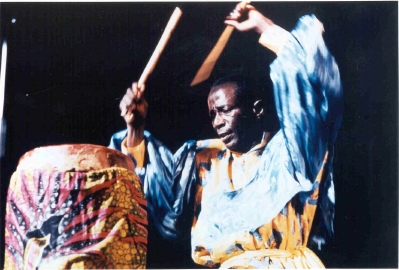 I’m closing with two selections from the great Senegalese percussionist Doudou N’Diaye Rose from his album Djabote. I have the golden opportunity not only to hear him play but also to dance to his drums and conduct a short interview with Doudou. Every phase of our encounter was an honor. “Diame” and “Walo” were recorded live on Goree Island off the coast of Senegal with fifty drummers and a choir of eighty singers.
To say this is a powerful ensemble is an extreme understatement. The hallmark of this music is unison ensemble drumming and singing. Odd as it may seem for an album of drumming, the best way to think of this is as music for meditation rather than dancing. This is probably one of the most calming examples of African drumming you will ever hear.
Once again, Baaba Maal, Kora Jazz Trio and DouDou N’Diaye Rose demonstrate just how accurate is the truism: out of Africa always something new.
—Kalamu ya Salaam
A country in West Africa
I enjoyed nearly all of these additional tracks from Senegal, and in retrospect, I'm glad Kalamu decided to post a few more Baaba Maal tracks. I love "Koni," but honestly, it isn't representative of most of Maal's music. The "Yele" remix was pretty funny. If I would've known that one was going to be in the jukebox, I could've skipped the whole paragraph about Senegal's place in Africa. Dude broke it all down in his rap:
I’m closing with two selections from the great Senegalese percussionist Doudou N’Diaye Rose from his album Djabote. I have the golden opportunity not only to hear him play but also to dance to his drums and conduct a short interview with Doudou. Every phase of our encounter was an honor. “Diame” and “Walo” were recorded live on Goree Island off the coast of Senegal with fifty drummers and a choir of eighty singers.
To say this is a powerful ensemble is an extreme understatement. The hallmark of this music is unison ensemble drumming and singing. Odd as it may seem for an album of drumming, the best way to think of this is as music for meditation rather than dancing. This is probably one of the most calming examples of African drumming you will ever hear.
Once again, Baaba Maal, Kora Jazz Trio and DouDou N’Diaye Rose demonstrate just how accurate is the truism: out of Africa always something new.
—Kalamu ya Salaam
A country in West Africa
I enjoyed nearly all of these additional tracks from Senegal, and in retrospect, I'm glad Kalamu decided to post a few more Baaba Maal tracks. I love "Koni," but honestly, it isn't representative of most of Maal's music. The "Yele" remix was pretty funny. If I would've known that one was going to be in the jukebox, I could've skipped the whole paragraph about Senegal's place in Africa. Dude broke it all down in his rap:
Senegal is a country in West Africa Between Gambia and Mauritania...(Don't know who it is rapping, but it obviously isn't Maal.) —Mtume ya Salaam
This entry was posted on Monday, March 31st, 2008 at 12:37 am and is filed under Contemporary. You can follow any responses to this entry through the RSS 2.0 feed. You can leave a response, or trackback from your own site.
4 Responses to “BAABA MAAL featuring ERNEST RANGLIN / “Koni””
March 31st, 2008 at 12:26 pm
My question over the years was actually “When y’all gonna do some Youssou?” I’d do a search from time to time and couldn’t believe when I kept seeing “No pages matched… ” I thought, surely this is a mistake or that you would eventually get to him. Surely.
Youssou’s my second favorite artist from Africa and in my top 5 of all musicians. I love “Egypt.” Most of the songs on there have that orchestra sound and exhibit, as Mtume mentioned, “strength and grace, power and calmness.” I think Youssou even won a Grammy for this album (Although P.E. begged the question some time back: “Who gives a F about a g damn Grammy?!). His albums “Nothing’s In Vain” and “Joko” are nothing to sneeze at either. I saw him in concert a few months ago in ATL and although I didn’t understand a word that was said all night (songs probably in French and maybe Wolof, and due to the majority Senegambian audience), it ranked as one of my best musical experiences ever. The whole vibe that night was pleasant.
I have one or two of Baba Maal’s albums, but I wasn’t feeling them. Since y’all did him this week, it will force me to re-visit his stuff to see what all this fuss is about.
March 31st, 2008 at 9:23 pm
Both Maal and N’Dour are stellar live performers and important figures in tuning the rest of the world into the richness and depth of senegalese music. I love both artists but, funnily enough, sometimes their international releases can leave me a little underwhelmed, mainly due to the addition of "slick" production values that seem to drain some of the vitality and energy from the music, I think the intriguing thing about listening to Baobab, or fellow compatriot Cheikh Lo, is in hearing the cuban and afro-caribbean sounds returning home and finding new expression
kalamu sez
ok, my man, you have peeped part of the whole card for next week. all i got to say right now is what happens if you get cuba, brazil, james brown & senegal together… word—don’t miss next week!
—kalamu
January 9th, 2009 at 10:31 pm
I’m desperatly trying to find any video of Baaba Maal when he had Mbaye Niasse as a drummer. He is a great drummer and taught current Baaba Maal drummer many of his techniques.
September 8th, 2009 at 12:17 pm
I’m a South African, but have been away from home(Africa) for almost 30years. And when I miss home,and just want to have the sounds, sights and smell in my deepest self, there is nothing faster, that can transport there then listening to the voices and music of Baaba, N’Dour, Masekela,Kidjo, Sibongile Khumalo and many more..Yes we are blessed in Africa to have such a rich history of musical genius…
Leave a Reply
| top |